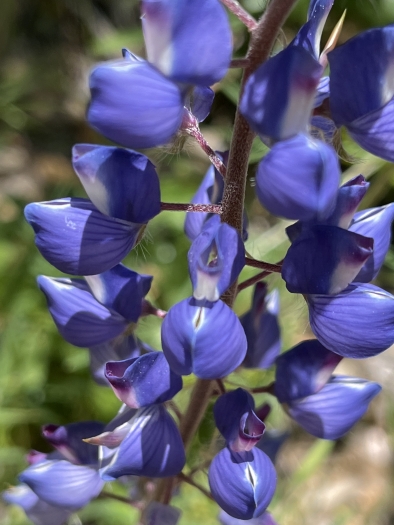Spider Lupine
(Lupinus benthamii)
Spider Lupine (Lupinus benthamii)
/
/

© rickr
CC BY 4.0
Image By:
© rickr
Recorded By:
Copyright:
CC BY 4.0
Copyright Notice:
Photo by: © rickr | License Type: CC BY 4.0 | License URL: http://creativecommons.org/licenses/by/4.0/ | Uploader: rickr | Publisher: iNaturalist |
























Estimated Native Range
Summary
Lupinus benthamii, commonly known as Spider Lupine, is an annual herb endemic to California’s chaparral, coastal sage scrub, and open woodlands, particularly in the Central Coast Ranges, Central Valley, and Sierra Nevada foothills. It typically grows 7.9 to 27.6 inches tall and features palmate leaves with 7 to 10 narrow leaflets. Spider Lupine produces erect racemes of bright to deep blue flowers, each with a distinctive white or pink spot on the banner. These flowers bloom in the spring and are quite showy, often covering hillsides with vibrant blue hues.
Spider Lupine is valued for its ability to adapt to poor soils and its use in wildflower meadows and native plant gardens, where it adds a splash of color. It is also beneficial for pollinators such as bees. In cultivation, it requires well-drained soils, minimal water once established, and thrives in full sun to partial shade. While it is not commonly used in urban plantings due to its specific habitat preferences, it can be a beautiful addition to restoration projects and naturalized areas. Care should be taken as Lupinus species can be toxic to livestock and pets if ingested. Spider Lupine is relatively low maintenance but can be susceptible to fungal diseases in wet conditions.CC BY-SA 4.0
Spider Lupine is valued for its ability to adapt to poor soils and its use in wildflower meadows and native plant gardens, where it adds a splash of color. It is also beneficial for pollinators such as bees. In cultivation, it requires well-drained soils, minimal water once established, and thrives in full sun to partial shade. While it is not commonly used in urban plantings due to its specific habitat preferences, it can be a beautiful addition to restoration projects and naturalized areas. Care should be taken as Lupinus species can be toxic to livestock and pets if ingested. Spider Lupine is relatively low maintenance but can be susceptible to fungal diseases in wet conditions.CC BY-SA 4.0
Plant Description
- Plant Type: Herb
- Height: 1-3 feet
- Width: 1-3 feet
- Growth Rate: Moderate
- Flower Color: Blue, Purple, White
- Flowering Season: Spring, Summer
- Leaf Retention:
Growth Requirements
- Sun: Full Sun, Part Shade
- Water: Low
- Drainage: Medium, Fast
Common Uses
Bee Garden, Bird Garden, Butterfly Garden, Drought Tolerant, Low Maintenance
Natural Habitat
Native to California’s chaparral, coastal sage scrub, and open woodlands
Other Names
Common Names: Bentham’s Lupine, Bentham Lupine
Scientific Names: , Lupinus benthamii, Lupinus leptophyllus,
GBIF Accepted Name: